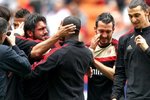L
Liquid validity
Depends who you ask.
There was a lively discussion on Saturday at my house between...
- A guy who has been spending 8 hours a day looking at Forex charts & MACD, Stochastics etc. and said that he felt he was getting nowhere.
The goal was to show Craig (the chart guy) that he should perhaps consider something else.
Interestingly, Prem had not really seen this 'dirty end' of trading, which is a total discretionary art. Being an academic in the field, he was very interested. We talked at length afterwards and the aspect he seemed to like most was that it was trading based on understanding the market as opposed to mathematical derivatives. Prem has done a LOT of research into the technical aspect of the market and found no correlations between technical factors and future price behaviour. His experience is that you need to understand in order to be able to trade. I agree but I don't think you need to understand (or watch) everything that impacts the market. Analysis paralysis & all that. He does think that volume is key and you can see that reflected in his work.
On the other hand, Prem did find relationships between fundamental factors and longer term performance. I brought up IPOs & lock in periods and he had a wealth of information to hand on how that impacts prices.
Now - this doesn't mean it's not a science or that science cannot be applied. What it does mean is that someone that has carried out significant research in the technical side of the market, doesn't use that to invest his own money, because he found no correlations.
Of course, looking for correlations in technical information means taking a mechanical approach. This is science. On the other hand, using technical information in a subjective/discretionary manner - that's an art.
At the end of the day, my impression was that the guy doing the stuff with forex charts wasn't convinced that the science way - finding an objective solution to the trading problem - was a dead end.
Strangely enough I agree with that 😆
I also believe a purely mechanical approach using indicators is highly unlikely to work.
We all know indicators lag, and that renders most of them pretty much useless in a conventional application.
They can give the illusion of working if experienced discretion is used, in truth
its probably more of a crutch.
A glorified coin flip is a better and more consistent approach on the science side.
Then you have the insti quants and all that jazz, more science again.
Not the science of the market - there is none there.
Its purely the science of randomness and probability.
To trade the market itself, then yes its an art or skill.
Yet despite all that, either way can still make money or lose money...
Without sound risk management, either way will fail.
I'd be hard pressed to describe risk management as an artform.
Therefore I'd say trading is the science of random probability risk management.
Simon Kerr talks to David Harding - The Hedge Fund Journal
David Harding says it much better than I could anyway.
Last edited:


